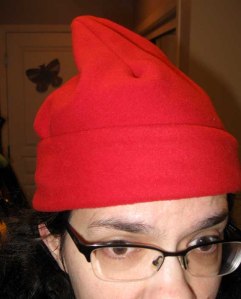I want to write about Terry Pratchett, and I don’t even know where to begin. He wrote so many wonderful and consoling things about death (or, y’know, Death) that I feel the tiniest bit guilty for being so very sad he’s gone. I feel like I should be able to face it with some kind of humorous equanimity, something like:
“DON’T THINK OF IT AS DYING, said Death. JUST THINK OF IT AS LEAVING EARLY TO AVOID THE RUSH.” — Good Omens
Ahahahaha! And yet. I has all the sad. I’m afraid I’m going to have to play it straight.
I never read any of his books until I moved to Canada, and even then I had several false starts. I tried reading The Colour of Magic and I didn’t get very far. It looked like a pile of undifferentiated jokes to me, and while the jokes were individually hilarious, in a heap they were rather overwhelming. It was like eating nothing but cake, all the time. Another one that I remember disliking was Maskerade, which as far as I could tell was nothing but a send-up of Phantom of the Opera. It was funny enough, for what it was, but I honestly couldn’t see what all the fuss was about.
I’m not sure why I kept trying.
Well, that’s not quite true. I kept trying because I had just moved to a foreign country where I knew no one outside my own household. I kept trying because I missed my friends back in Philly, and I’m pretty sure they were the ones who’d recommended Pratchett to me in the first place. I kept trying because I really, really needed a friend right then, and miraculously, I found one.
Going Postal was the book that finally opened the door for me, the one that made me realize there was a human behind the mountains of jokes, a human who was preoccupied with many of the same things I was. The Tiffany Aching books followed close on its heels, as well as Thud!, and by the time I’d gotten through those I felt like I knew exactly who I was dealing with.
And he was something remarkable, something I’d never quite seen before. He was using the twin fists of humour and fantasy to punch the world in the face. These were, in fact, extremely serious books about difficult and hard-hitting subjects, but he’d disguised it so cleverly that you couldn’t quite tell. I think the mask did slip a bit in his later years, and that was why I found his more recent books more accessible. I find it easier to read the early ones now that I’ve glimpsed the wellsprings beneath them; his preoccupations have been the same all along, and now that I know what to look for I see them everywhere, shining like diamonds.
I wrote a little tribute to him on the Terry Pratchett Appreciation Tumblr a couple years ago, and I don’t think I can sum up his influence on my writing any more perfectly than this:
Nothing was out of bounds, not death, love, politics, or religion. A fantasy writer could say exactly what needed to be said and could run any thought experiment conceivable. It was a revelation, and it set me free.
I cried when I learned that he had died, and I cried again later that day when a middle-school student asked me who my favourite writer was. “Isn’t it amazing,” I said, “how deeply books can move you, and what a strong connection we can feel to someone we never met?”
I used to call him, only half-jokingly, my long-lost time-travelling twin, or my spiritual uncle, because we were preoccupied with so many of the same kinds of questions. We didn’t always come to the same conclusions, but his were always humane, hilarious, and well worth considering.
“Light thinks it travels faster than anything but it is wrong. No matter how fast light travels, it finds the darkness has always got there first, and is waiting for it.” —Reaper Man
Thank you for everything, old friend. I’m going to miss you.

